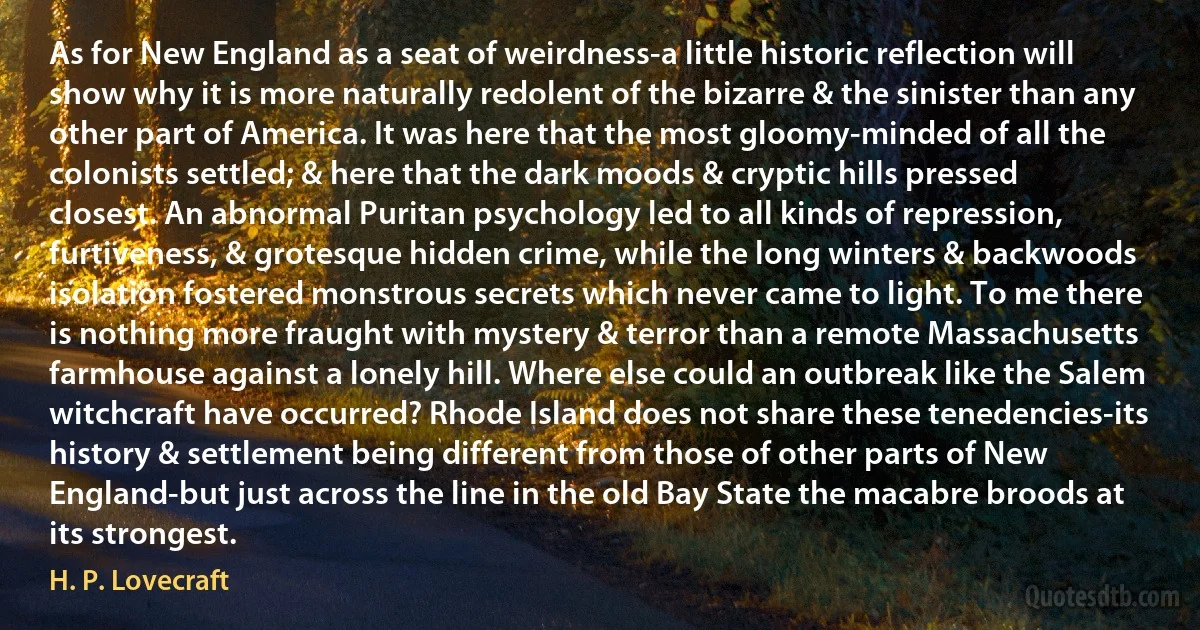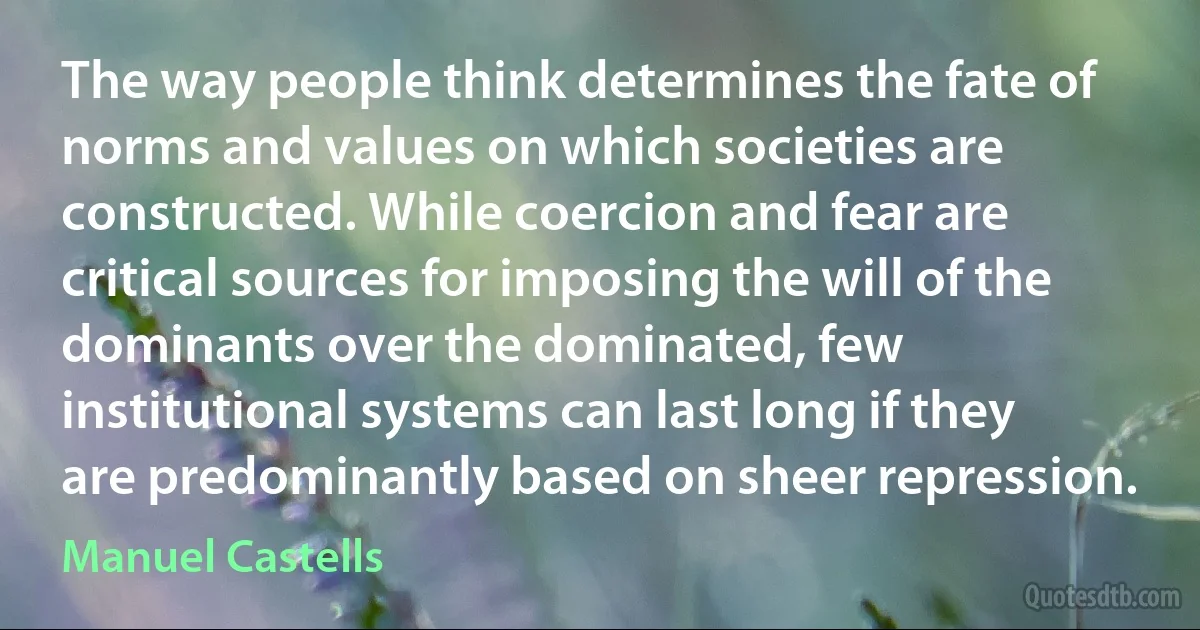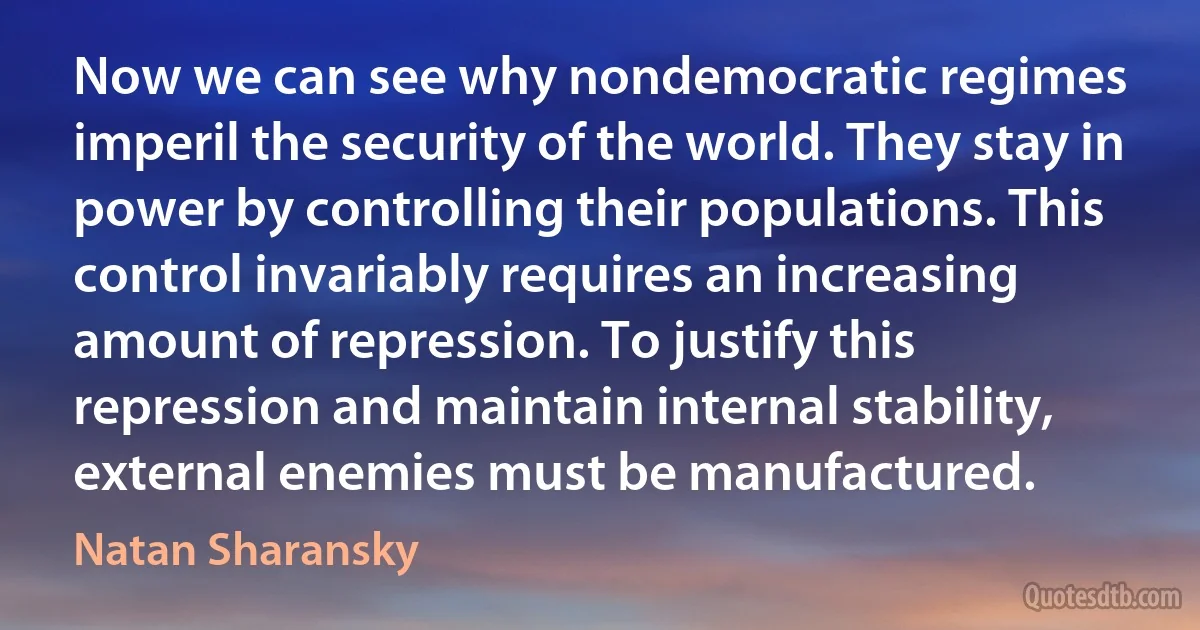Repression Quotes - page 3
When you look at organised religion of whatever sort - whether it's Christianity in all its variants, or whether it's Islam or some forms of extreme Hinduism - wherever you see organised religion and priesthoods and power, you see cruelty and tyranny and repression. It's almost a universal law.

Philip Pullman
We know, deep down, that repression is not the wave of the future. We know that the desire for freedom is not confined to, or owned by, any culture; it is the inborn hope of our humanity. We know that free governments are the only way to ensure that the strong are just and the weak are valued. And we know that when we lose sight of our ideals, it is not democracy that has failed. It is the failure of those charged with preserving and protecting democracy.

George W. Bush
In the 21st century, the world needs a confident and effective United Nations. This unique institution should build on its successes and improve its performance. Where there is inefficiency and corruption, it must be corrected. Where there are bloated bureaucracies, they must be streamlined. Where members fail to uphold their obligations, there must be strong action. For example, there should be an immediate review of the Human Rights Council, which has routinely protected violators of human rights. There should be a stronger effort to help the people of Burma live free of the repression they have suffered for too long. And all nations, especially members of the Security Council, must act decisively to ensure that the government of Sudan upholds its commitment to address the violence in Darfur.

George W. Bush
Homophobia is like racism and anti-Semitism and other forms of bigotry in that it seeks to dehumanize a large group of people, to deny their humanity, their dignity and personhood. This sets the stage for further repression and violence that spread all too easily to victimize the next minority group.

Coretta Scott King
It is possible not to think about something for a long time, even something unpleasant that happened to you. But what's been claimed in these repressed-memory cases is something, by definition, that's too extreme to be explained by ordinary forgetting and remembering. They're saying that in order to go on in life, you had to wall off this memory, because it would be too painful to live with. Then finally you go into therapy and crack through the repression barrier and out comes this pristine memory. But there really is no credible scientific support for that notion.

Elizabeth Loftus
Amerika is just another Latin dictatorship. Those who have doubts should try the minimal experience of organizing a large rock festival in their state, sleeping on some beach in the summer or wearing a flag shirt. Ask the blacks what it's been like living under racism and you'll get a taste of the future we face. As the repression increases so will the underground - deadly groups of stoned revolutionaries sneaking around at night and balling all day.

Abbie Hoffman
It is likely that the emphasis upon the metaphysical and epistemological implications of the sociology of knowledge can be traced, in part, to the fact that the first proponents of this discipline stemmed largely from philosophical rather than scientific circles. The burden of further research is to turn from this welter of conflicting opinion to empirical investigations which may establish in adequate detail the uniformities pertaining to the appearance, acceptance and diffusion, or rejection and repression, development and consequences of knowledge and ideas.

Robert K. Merton
[A]dventures befall the unadventurous as readily, if not as frequently, as the bold. Adventures are a logical and reliable result-and have been since at least the time of Odysseus-of the fatal act of leaving one's home, or trying to return to it again. All adventures happen in that damned and magical space, wherever it may be found or chanced upon, which least resembles one's home. As soon as you have crossed your doorstep or the county line, into that place where the structures, laws, and conventions of your upbringing no longer apply, where the support and approval (but also the disapproval and repression) of your family and neighbors are not to be had: then you have entered into adventure, a place of sorrow, marvels, and regret.

Michael Chabon
The West and its media have barely covered the recent wave of repression in Turkey. The reason is simple. They are paying billions to Ankara to control and take back the refugees of the Syrian war. They are fearful that if they offend Tayyip Erdogan he will use the refugees as a political weapon. So they keep quiet.

Tariq Ali
The regime maintains its suffocating grip over the citizens by using brute force and repression of dissent. Gruesome acts of public executions are barbaric methods and chilling reminders of the fate of dissenters in Iran. Through fear and humiliation, the regime commands submission. Public stoning of women and the execution of underage youth are revolting reminders of the regime's callous disregard for human life, dignity and civility.

Reza Pahlavi
It is critical to understand that the clerical regime sought – and continues to seek – to challenge America and its regional allies as a convenient way for it to deflect attention from its abhorrent policies of ongoing repression and terror against my fellow Iranians. While our precious national resources are being utilized by the clerical regime to export revolution, the Iranian people are being left without access to basic necessities, rapidly losing a standard of living that was once the envy of many around the world, and they live in a state of perpetual tyranny.

Reza Pahlavi
The Arabs could have peace tomorrow if sufficient numbers of Palestinians were not content to be used as cannon fodder in fruitless assaults on Israel, even as the surrounding Arab powers distract the Arab masses with the red herring of Israel while retarding their countries with their repression and corruption.

Conrad Black
It is with regret that I have again to announce a continuance of the disturbed condition of the island of Cuba. No advance toward the pacification of the discontented part of the population has been made. While the insurrection has gained no advantages and exhibits no more of the elements of power or of the prospects of ultimate success than were exhibited a year ago, Spain, on the other hand, has not succeeded in its repression, and the parties stand apparently in the same relative attitude which they have occupied for a long time past.

Ulysses S. Grant
In this world, as in our own, nearly all the chief means of production, nearly all the land, mines, factories, railways, ships, were controlled for private profit by a small minority of the population. These privileged individuals were able to force the masses to work for them on pain of starvation. The tragic farce inherent in such a system was already approaching. The owners directed the energy of the workers increasingly toward the production of more means of production rather than to the fulfilment of the needs of individual life. For machinery might bring profit to the owners; bread would not. With the increasing competition of machine with machine, profits declined, and therefore wages, and therefore effective demand for goods. Marketless products were destroyed, though bellies were unfed and backs unclad. Unemployment, disorder, and stern repression increased as the economic system disintegrated. A familiar story!

Olaf Stapledon
Islam's jihad is a struggle against idolatry, sexual deviations, plunder, repression, and cruelty. The war waged by [non-Muslim] conquerors, however, aims at promoting lust and animal pleasures. They care not if whole countries are wiped out and many families left homeless. But those who study jihad will understand why Islam wants to conquer the whole world. All the countries conquered by Islam or to be conquered in the future will be marked for everlasting salvation. For they shall live under.

Ruhollah Khomeini
[T]hus one should not think that desire is repressed, for the simple reason that the law is what constitutes both desire and the lack on which it is predicated. Where there is desire, the power relation is already present: an illusion, then, to denounce this relation for a repression exerted after the event.

Michel Foucault
In the history of madness, two events signal this change with singular clarity: in 1657, the founding of the Hôpital Général, and the Great Confinement of the poor; and in 1794, the liberation of the mad in chains at Bicêtre. Between these two singular and symmetrical events, something happened, whose ambiguity has perplexed historians of medicine: blind repression in an absolutist regime, according to some, and, according to others, the progressive discovery, by science and philanthropy, of madness in its positive truth. In fact, beneath these reversible meanings, a structure was taking shape, which did not undo that ambiguity but was decisive for it. This structure explains the passage from the medieval and humanist experience of madness to the experience that is our own, which confines madness in mental illness.

Michel Foucault



